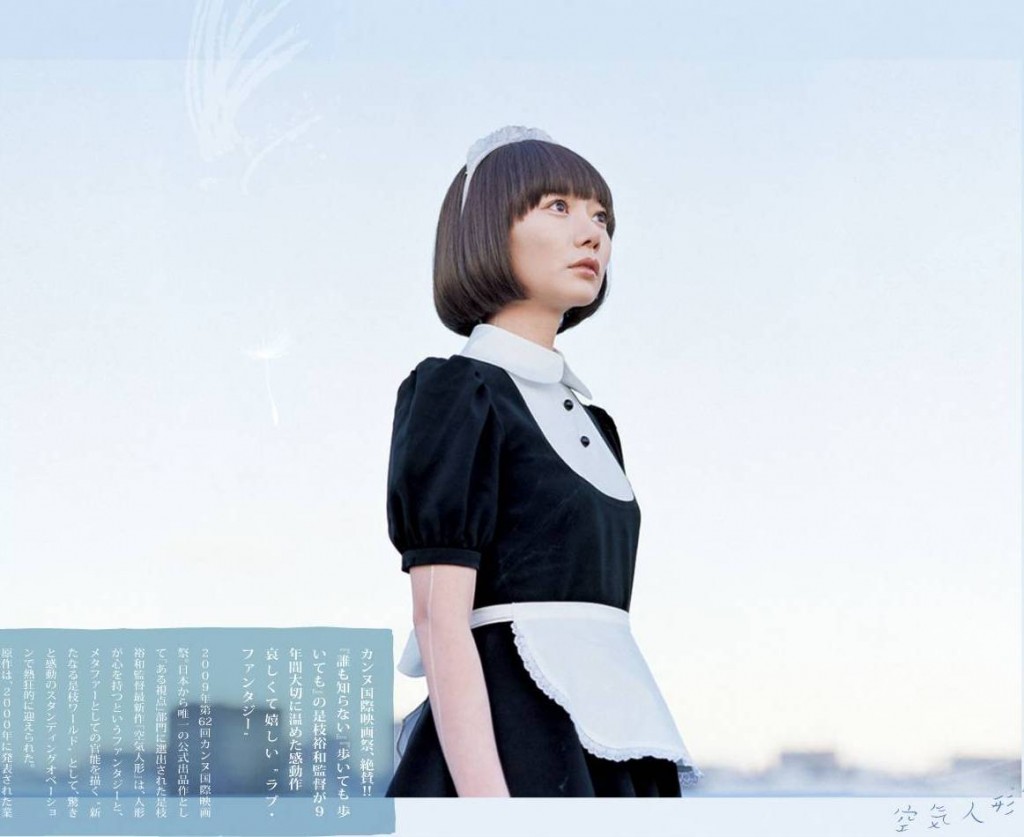Air Doll Review
 The premise of Air Doll is one than will instantly alienate a lot of people, which is unfortunate as it is a premise that Koreeda uses not in the most obvious ‘wacky’ way that people might expect but to investigate emotional subjects. The film is based on a Manga by Yoshiie Goda entitled The Pneumatic Figure of a Girl and centres on an inflatable sex doll who comes to life and explores the world around her.
The premise of Air Doll is one than will instantly alienate a lot of people, which is unfortunate as it is a premise that Koreeda uses not in the most obvious ‘wacky’ way that people might expect but to investigate emotional subjects. The film is based on a Manga by Yoshiie Goda entitled The Pneumatic Figure of a Girl and centres on an inflatable sex doll who comes to life and explores the world around her.
The sex doll in question, Nozumi, is played by Bae Du-Na, whose performances in The Host and Linda Linda Linda and now this have made it clear that she is a talented actress who will hopefully continue to get roles that afford her the opportunity to show her obvious skills as an actress.
Nozumi is owned by a restaurant waiter Hideo (Itao Itsuji) who mostly treats her as if she were real, buying her clothes, having dinner with her and of course engaging in sexual activities with her. One day, whilst he is at work, Nozumi transforms from an ‘Air Doll’ into something else. She is not a human as she still retains her seams, is full of air and is made of plastic, although she does not look plastic, but now she is ‘alive’. Once Nozumi comes alive she sets out to explore the world with what Bae Du-na has described as a soul “as pure, as beautiful and as spotless as a new born baby’s.”
An innocent character who explores the world is a theme that has come up in literature and film before with obvious but not wholly appropriate comparisons to Pinnochio coming to mind.A better point of comparison is probably the 1993 Rolf de Heer film, Bad Boy Bubby, in which Bubby emerges from a cocoon like existence into a world that he does not understand, gradually exploring and seeing both the dark and light sides of humanity. Nozumi’s world to explore is a city and this is the type of world that Koreeda is exploring with the film.
Nozumi comes into contact with a variety of characters, including a Bulimic Hikikomori (a reclusive individual), a woman worried about her fading beauty, a father trying to connect to his daughter, a woman who constantly confesses to crimes she did not commit and the two staff of a video store where Nozumi gets a job. At the video store she learns more about the world from watching films she is recommended and forms a relationship with fellow worker, Junichi (Arata), who even finds out and excepts the truth about Nozumi in a particularly dramatic and comic scene.
The characters that Nozumi encounters are like her in many ways, empty and missing something inside. This point is one that is perhaps too plainly signified in the film, at one point even commented on by a character, but it is nonetheless a powerful and effective part of the film. Koreeda clearly sets out to explore the nature of city life and like his film Afterlife there is a clear interest in the human condition and in social interactivity, or the lack of, in city life. Unlike some I did not feel this was too heavy handed as the film was so meditative and slow-paced for the most part that the ideas on display were allowed time to breath and for the viewer to consider the themes whilst the drama unfolded.
Aided by a beautiful score by World’s End Girlfriend the film slowly unravels with tenderness and beautiful pathos only briefly lapsing into dark scenes which help bring the film back to reality from it’s more fantastical moments. Without wanting to spoil the ending too much I will say that it is absolutely heartbreaking and although incredibly sad there is still hope and beauty. The film is beautiful throughout and an excellent addition to Koreeda’s intriguing filmography. Bae Du-Na’s central performance is also absolutely stunning, one of the best I have seen this year, and this alone would be reason enough to watch this excellent film.